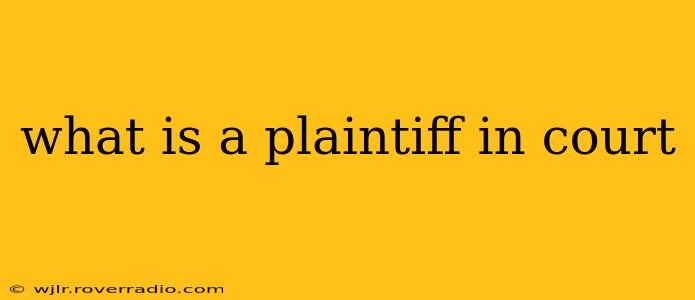What is a Plaintiff in Court? Understanding the Role in Legal Proceedings
In the world of law, understanding the roles of different parties involved in a case is crucial. One of the most fundamental roles is that of the plaintiff. Simply put, the plaintiff is the individual or entity who initiates a lawsuit. They are the party who believes they have been wronged and are seeking legal redress from the court. This could be for a wide range of reasons, from breach of contract to personal injury.
Let's delve deeper into the specifics of what defines a plaintiff and their role in legal proceedings.
Who is a Plaintiff?
A plaintiff can be:
- An individual: A single person bringing a lawsuit, perhaps claiming damages resulting from a car accident or defamation.
- A corporation: A company initiating legal action, for instance, suing another company for patent infringement.
- A government entity: A city, state, or federal government filing a lawsuit, perhaps for environmental violations.
- A group of individuals: In class-action lawsuits, multiple plaintiffs with similar claims are represented collectively.
What does a Plaintiff do?
The plaintiff's primary function is to:
- File a complaint: This is the initial document that formally begins the lawsuit. It outlines the claims against the defendant(s), the alleged wrongdoings, and the relief sought (e.g., monetary damages, injunction).
- Present evidence: During the trial, the plaintiff bears the burden of proof. They must present evidence, including witness testimony, documents, and expert opinions, to support their claims.
- Answer questions: The plaintiff will be subject to questioning by the defendant's attorney (cross-examination) and their own attorney (direct examination).
- Cooperate with the legal process: This includes responding to discovery requests, attending hearings, and participating in any settlement negotiations.
What is the difference between a Plaintiff and a Defendant?
This is a key distinction: The defendant is the party against whom the lawsuit is filed. They are the individual or entity accused of wrongdoing and is required to respond to the plaintiff's claims. The plaintiff initiates the legal action; the defendant responds to it.
What are the types of lawsuits a Plaintiff might file?
Plaintiffs can file a wide range of lawsuits including but not limited to:
- Personal Injury Lawsuits: These arise from accidents or negligence causing physical harm.
- Breach of Contract Lawsuits: These involve a failure to uphold the terms of an agreement.
- Property Disputes: Cases concerning ownership, boundaries, or damage to property.
- Family Law Cases: Cases relating to divorce, child custody, or support.
What happens if the Plaintiff loses the case?
If the plaintiff loses, the court typically rules in favor of the defendant. This doesn't necessarily mean the plaintiff was wrong, but simply that they failed to meet the burden of proof. The plaintiff usually cannot re-file the same case (although there are exceptions).
Understanding the role of the plaintiff is essential for navigating the complexities of the legal system. They are the driving force behind initiating legal action, and their success hinges on effectively presenting their case and meeting the burden of proof. This overview provides a solid foundation for comprehending their pivotal role in legal proceedings.
